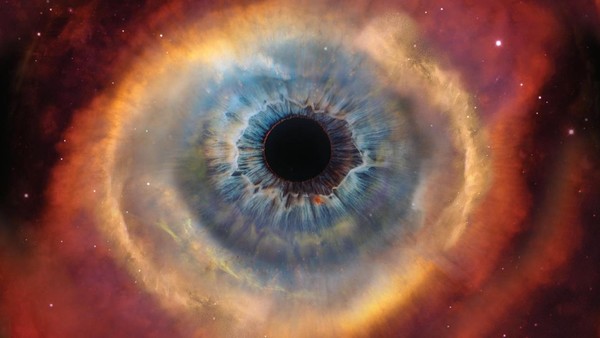A Souring Spiritual Experience: Cosmos: A Space Time Odyssey: Episode 2
In an area of Oklahoma the first episode of Cosmos: A Spacetime Odyssey ran twenty seconds shorter than the rest of the country. What was significant about those twenty seconds? That was the time when evolution was discussed. If it was intentional (station executives say it was not) I wonder how much of this week’s episode was shown at all. Episode 2: The Things Molecules Can Do was evolution start to finish.
I’m tempted to say that a prime time network show – on FOX no less – that is almost completely devoted to evolution, is brave. But that is only because I’m an American and I live in a country that tells us to question scientific data on religious grounds. The fact is, a program about evolution is not brave, it’s normal. What I actually found strange was the amount of spiritual language used to explain scientific ideas.
Before I get into that I want to recap the episode bit.
It begins with dogs (and for my money you can’t go wrong if you begin with dogs). Neil deGrasse Tyson, the host, explains while sitting around a fire, the history of the domestication of dogs. He then goes on to explain the “selective evolution” of dog breeds. It’s a strong start. You cannot, no matter what your religious or philosophical background, deny that humans created dogs and continues to shape them. Mini-evolution.
We are then treated to a molecular journey through the reproductive organs of a bear to see how a polar bears evolved. And then a wonderful refutation of the Intelligent Design core argument for creation – the eye. I’m quite taken by the fact that NDT and the production team are not shying away from controversy and creationism, but rather taking it on; direct and without reservation. The idea that the human eye is without precedent and could only be created by an intelligent designer is a central premise of creationists like Michael Behe. The episode not only explains the evolution of the eye in a simple but detailed way but also gives a “creatures view” split screen to visualize the evolutionary growth of vision. Very cool.
Finally the episode ends with a trip through an imaginary extinction museum and a dip in Titan’s strange oceans. Overall a beautiful and entertaining episode, I have no real complaint other than one of philosophical terminology. I will explain.
Neil deGrasse Tyson has a wonderful way of phrasing the majesty of the Universe. When he speaks of DNA and the molecules within us he says, “We are, each of us, a little universe.” And when he talks our relationship with apes and monkeys he says, “No one can embarrass us like a relative.” These are great lines and get a laugh and a gasp. But then goes on to speak of evolution as a “souring Spiritual experience” and other pseudo-religious terminology. In articles and interviews he has been described as an “evangelist” of science and a “preacher” of science. This bothers me.
I don’t think that NDT embraces this; to the contrary interviews suggest he rejects it. But it is how he is perceived, at least in popular media. And Cosmos seems to be playing up the religious aspect.
For me I am extremely reluctant to use words like “evangelist” or “preacher” even when combined with the word “science”. Science is science. It does not have to be couched in the terminology of religion to prove its validity or even to reach a bigger audience. This is what I assume to be what this rhetoric is all about. Using spiritual language to appeal to a larger demographic. The use of religious imagery in science-in-layman-terms presentations in not uncommon. Look no further than “The God Particle” for an example of this.
It’s just always felt like a bit of a cop-out. The idea of phrasing you argument in someone else’s terms is … defensive, like you’re not sure of your position. Science should not have to use religious terms to explain or validate itself. In the same way, religion should not be forced to use scientific terms to explain its ideas. They are different. They function in completely different way and have completely different goals.
Science can never and will never prove or disprove the existence of God. And it shouldn’t try. That’s not what it’s meant to do.
Similarly, the Bible can’t explain the origin of the universe. At least not rationally. And there’s the rub.
Science is rational. Religion is metaphorical. They both help us explain the world (universe/cosmos) in different ways. Not incompatible ways, mind you. Science can inform religion (doesn’t God seem greater in a vast universe of infinite possibility?) and religion can inform science (in a vast universe of infinite possibility you can still be one with God).
To put it another way: when you take the Bible literally (or Torah, or Koran, or Dhammapada, etc.) you lose its power. You strip it of its metaphor; you strip it of its spirit. You reduce scripture and spirituality to a textbook. You remove its importance, you diminish its impact. Religion should touch you philosophically, emotionally. In un-rational ways.
Similarly science should touch you intellectually. In very rational ways. If you treat science as a metaphor you decrease the value of the empirical and historical evidence inherent in it.
Science makes religion greater by expanding the knowledge of reality greater than what our minds can conceive. Religion makes science greater by forcing us to think in grander and abstract ways.
This is not a competition, this is a collaboration.
Spirit and space are distinct and different but both enrich us in ways that are unfortunately unrecognized in our current intellectual climate. As much as I love Cosmos and will continue to sing its praises, there are ways in which it perpetuates stereotypes of science that I wish we could move past. Burning straw men that would be best left alone and ignored.
And at the same time here is a program that is making me think about science and religion and language and .. well it’s making me think. This is a good thing.
If I have one bit of advice for Cosmos going forward it’s this: Just be science.
It’s okay to be who you are, to be what you are. Don’t hide behind someone else’s language or someone else’s ideas. Just tell the truth and everything will be okay.
See you next week.











Andy Garcia says:
Joe says:
Paul Matthew Carr says: